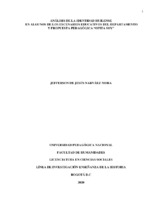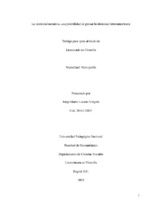Mostrar el registro sencillo del ítem
Territorio e identidad : educación geográfica para la construcción de identidades.
| dc.contributor.author | Rodríguez Lestegás, Francisco | spa |
| dc.date.issued | 2012-02-02 | |
| dc.identifier | https://revistas.pedagogica.edu.co/index.php/anekumene/article/view/7347 | |
| dc.identifier | 10.17227/Anekumene.2012.num3.7347 | |
| dc.identifier.issn | 2248-5376 | |
| dc.identifier.uri | http://hdl.handle.net/20.500.12209/8338 | |
| dc.description.abstract | Las fronteras cada vez más difusas y porosas del Estado-nación, la multiplicación de centros de decisión, la interdependencia planetaria y la emergencia de fuerzas políticas y económicas transnacionales son las tendencias que definen el mundo actual. De este modo, sociedades relativamente homogéneas han ido adquiriendo un carácter multiétnico, multilingüe y multicultural, configurándose como “espacios sociales multiculturales” sumamente propicios a la emergencia de identidades confusas, cuando no contradictorias. Por consiguiente, la consideración del Estado nacional como fuente principal o única de identidad y la histórica conexión entre nacionalidad y ciudadanía deben ser revisadas y redefinidas. En la actualidad, la relación con un territorio que marca el concepto de ciudadanía se desarrolla a diferentes escalas, que van desde lo local a lo internacional, lo que requiere apostar a favor de una educación geográfica que permita realizar una lectura crítica de la identidad territorial. | spa |
| dc.format.mimetype | application/pdf | spa |
| dc.language.iso | spa | |
| dc.publisher | Editorial Universidad Pedagógica Nacional | spa |
| dc.relation | https://revistas.pedagogica.edu.co/index.php/anekumene/article/view/7347/5998 | |
| dc.rights.uri | http://creativecommons.org/licenses/by-nc/4.0/ | |
| dc.source | Anekumene; Núm. 3 (2012); 10-27 | spa |
| dc.subject | Identidad nacional | spa |
| dc.subject | Identidades múltiples | spa |
| dc.subject | Identidad intercultural | spa |
| dc.subject | Educación geográfica | spa |
| dc.title | Territorio e identidad : educación geográfica para la construcción de identidades. | spa |
| dc.subject.keywords | National identity | eng |
| dc.subject.keywords | Multiple identities | eng |
| dc.subject.keywords | Intercultural identity | eng |
| dc.subject.keywords | Geographical education | eng |
| dc.subject.keywords | Identidade nacional | eng |
| dc.subject.keywords | Identidade múltiplas | eng |
| dc.subject.keywords | Identidade intercultural | eng |
| dc.subject.keywords | Educação geográfica | eng |
| dc.rights.accessrights | info:eu-repo/semantics/openAccess | |
| dc.rights.accessrights | http://purl.org/coar/access_right/c_abf2 | |
| dc.type.local | Artículo de revista | spa |
| dc.type.coar | http://purl.org/coar/resource_type/c_6501 | eng |
| dc.type.driver | info:eu-repo/semantics/article | eng |
| dc.title.translated | Territory and identity : geographic education for the construction of identities. | eng |
| dc.description.abstractenglish | The increasingly diffuse and porous borders of the Nation-state, the multiplication of decisionmaking centres, the global interdependence and the emergence of transnational political and economic forces are the trends defining the current world. Thus, relatively homogeneous societies have been becoming multiethnic, multilingual and multicultural, and have been growing as ‘multicultural social spaces’ extremely favourable to the emergence of confusing and even contradictory identities. Therefore, the consideration of the national State as the identity’s main or only source and the historical connection between nationality and citizenship must be reviewed and redefined. Today, the relationship with a territory that marks the concept of citizenship is developed at different scales, ranging from local to international. This requires to go for a geographical education that allows a critical analysis of the territorial identity | eng |
| dc.type.version | info:eu-repo/semantics/publishedVersion | |
| dc.rights.creativecommons | Attribution-NonCommercial 4.0 International | |
| dc.type.other | Artículo revisado por pares | spa |
Ficheros en el ítem
| Ficheros | Tamaño | Formato | Ver |
|---|---|---|---|
|
No hay ficheros asociados a este ítem. |
|||
Este ítem aparece en la(s) siguiente(s) colección(ones)
-
Anekumene [169]
Interesada en divulgar reflexiones e indagaciones asociadas con la geografía, la educación y la cultura.



